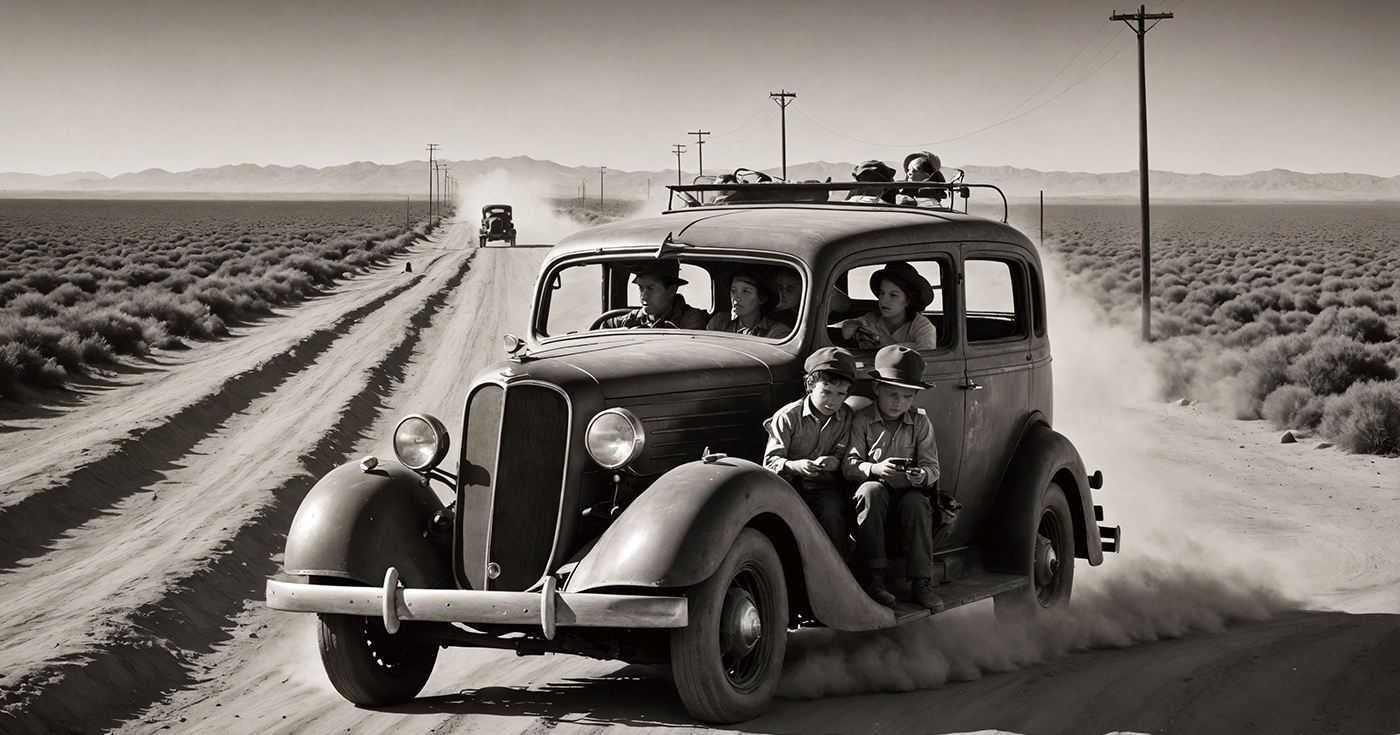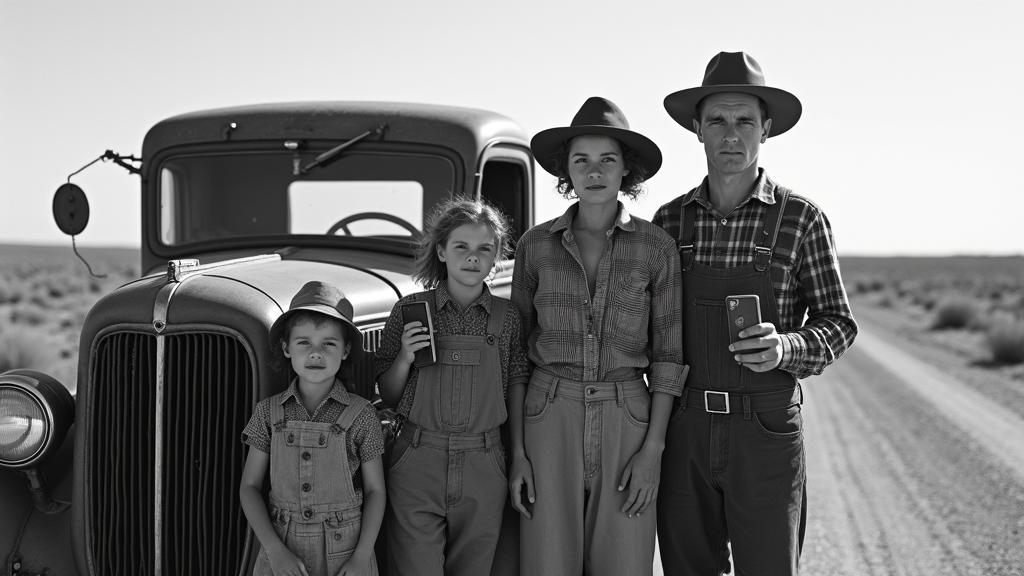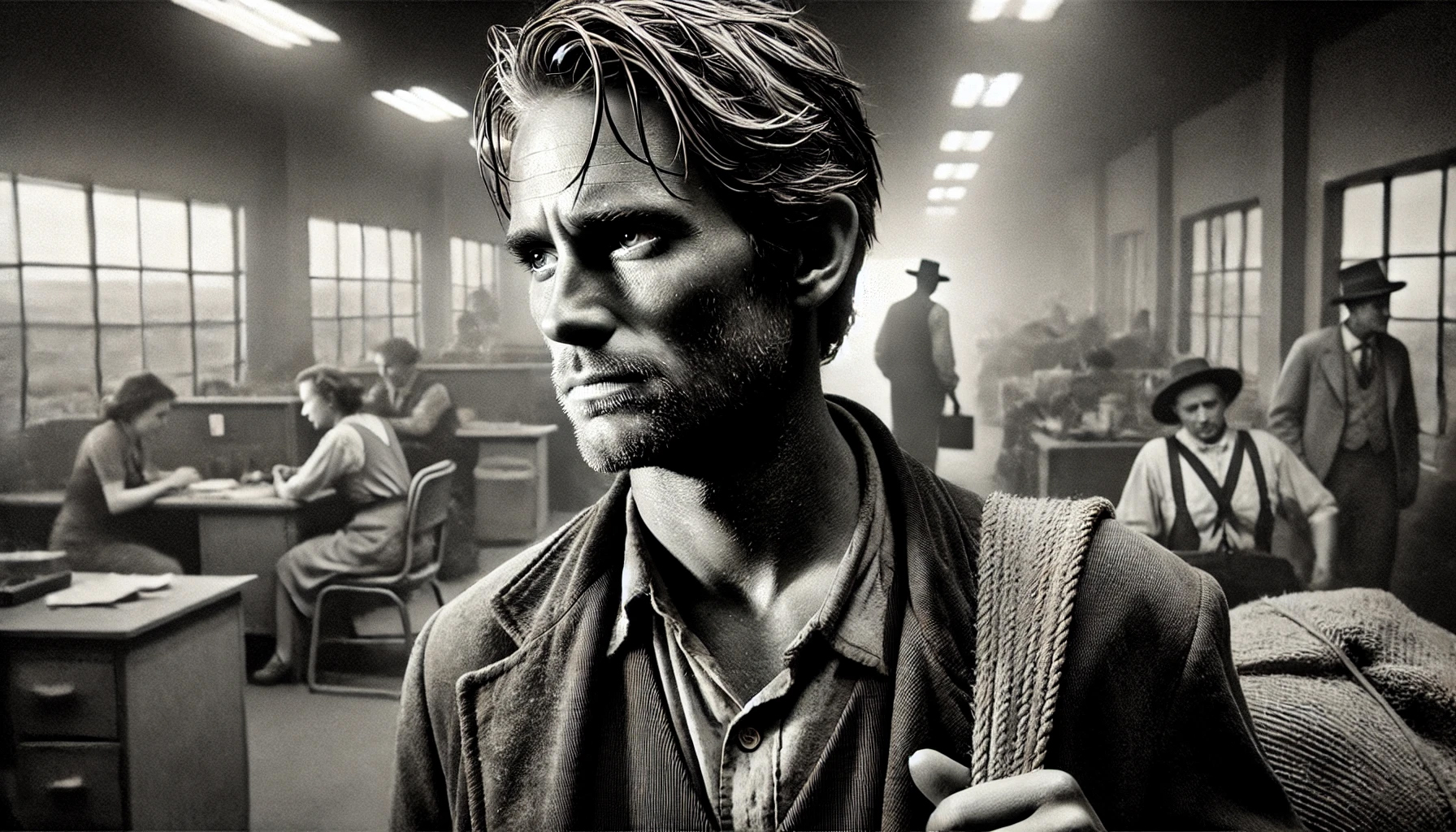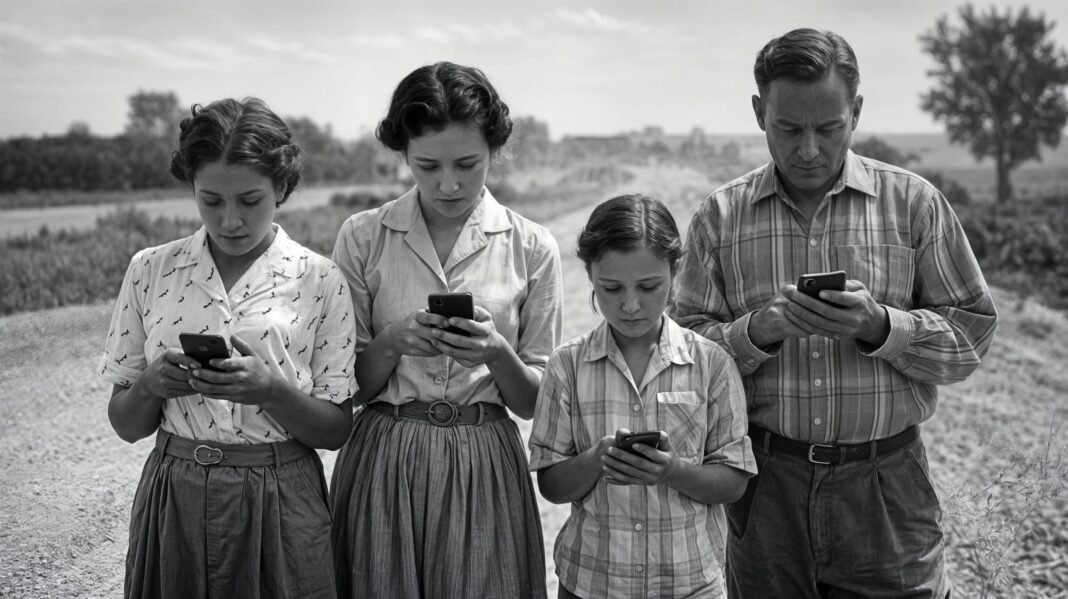“We have only one story. All novels, all poetry, are built on the never-ending contest in ourselves of good and evil.” – East of Eden, John Steinbeck.
Chapter I. Dust in the Algorithmic Wind
In the cold fluorescence of TikTok’s headquarters, where the light never seemed to shift or soften, Tom Joad stood by a tall window that didn’t open, staring out into a world he barely recognized. The sky beyond the glass was split between corporate high-rises and the faintest traces of smog, stretching endlessly over streets lined with screens and the restless hum of commuters, each with their eyes glued to tiny glowing devices that promised them everything yet gave them nothing.
Inside, the building was a stark contrast to the dust and soil Tom had known in his youth. LEDs buzzed faintly in the white-walled corridors, casting a sterile glow on rows of developers and interns who clicked and typed with mechanical precision. Their fingers danced across sleek keyboards, eyes never straying from the screens. Monitors blinked and flickered in endless patterns of motion—streams of data, spikes of engagement, metrics crawling up the screen like harvest yields after a good rainstorm.
Only here, there was no rain, no fields, and no earth at all—just numbers and swipes.
He felt something cold in his gut—a kind of emptiness that gnawed at him slowly, like the hollowness of a crop gone dry before harvest. He hadn’t wanted to come here, but Sarie had insisted, her voice bright with the confidence of youth, sure that this was the future. She used words like “opportunity” and “relevance” until they lost their meaning, and Tom, not understanding but trusting his younger sister, came along to see this strange new world for himself.
And what a world it was.
Rows of screens blinked with flashing videos, thirty-second bursts of content—all glitter and sound, faces animated with expressions exaggerated for viral effect. The people behind the desks, a young and hungry-looking bunch, worked not for the pleasure of the task but for the ever-ticking clock of “engagement”—the kind that came in sharp peaks and valleys, measured by hearts and thumbs and the occasional repost.
It was here, in this clean, fast-moving digital world, that Tom had been brought to witness something incomprehensible. TikTok’s latest project—a bold new initiative—was being hailed as revolutionary: the complete works of John Steinbeck, distilled, compressed, and repackaged into a single, five-minute video. The entire arc of hardship, the slow churn of injustice, the aching beauty of lives lived against the relentless forces of poverty and nature—now compacted into a quick, snackable format for the modern viewer.
Tom glanced at a nearby screen, catching a glimpse of a preview for the video: a young man, his face caked in digital sepia dust, wearing a loose shirt that flapped in an artificially rendered wind, staring off into the distance, his eyes wide and empty. Below him, a caption flickered: “Wherever there’s a fight, I’ll be there. #GrapesOfRap.”
A slow, bitter wave rose in Tom’s chest, a kind of sadness edged with something darker—something he couldn’t quite name but that gnawed at him as surely as the loss of land had once gnawed at his father.
All around him, the TikTok developers buzzed with excitement. They spoke in terms he only half-understood, words like “click-through rate” and “audience retention,” their hands racing across sleek black desks, arranging graphics, hashtags, and music loops in dizzying combinations. They didn’t look up. Didn’t stop. They were blind, Tom thought—not in the way his grandfather had once gone blind from old age, but in a way that was far more dangerous.
They were blind to what they were doing, blind to the stories they were cutting apart, rendering into bits and pieces. They didn’t see that the tales of men and women who had struggled against the earth and their own hardships could not be reduced to something so simple, so fleeting. And yet, here they were, pressing on, oblivious to the deeper meaning.
Tom, with his one good eye, saw it clearly, though it unsettled him in a way he couldn’t articulate. He had once believed in the fight for justice, dignity, and land. Now, he wasn’t sure what was left to fight for in a world where nothing stayed still long enough to be understood.
There was something in him—something old, inherited from the earth itself—that couldn’t make sense of this place. Here, everything moved faster than thought, faster than memory. And memory, he knew, was what kept people anchored to the things that mattered. If people forgot the old stories, if they forgot where they came from, what was left of them? What did they stand on?
The sound of clattering keys and clicking mice filled the room like the rustling of dry leaves in a dead wind, a sound that only deepened the hollow in Tom’s gut. He turned back to the window, his reflection a faint outline against the backdrop of a world moving too fast to hold.
The digital landscape stretched out before him, vast and endless, a desert of endless scrolling, and he wondered if it had all been lost—not just the land, but the stories too, the meaning of what it meant to struggle, to fight, to live.
Behind him, a developer shouted with excitement: “We did it! The whole Steinbeck catalog in under five minutes! This is gonna be huge.”
Tom didn’t turn around. In the land of the blind, he thought, the one-eyed man wasn’t king—he was just another lost soul.
Chapter II. The Joad Family’s Digital Migration
Sarie’s Faith in the Viral Dream
Sarie Joad stood at the center of the open-plan office, her eyes wide with the sort of excitement that Tom hadn’t seen since they’d first crossed into California, back when the sky seemed endless, and the land was ripe with promise. She moved with the confidence of someone who thought she’d found the way forward, a path paved not with sweat and toil but with views, clicks, and digital engagement. The faint glow of her phone lit up her face, the brightness reflecting off her eager eyes as she waved Tom over.
“You gotta see this, Tom,” she said, her voice rising above the dull hum of keyboards clattering and developers murmuring. She thrust the phone into his hands, the screen already playing the video she’d been talking about for days.

Tom squinted at the small screen, watching as the carefully rendered clip unfolded before him. The Joad family’s harrowing journey across the Dust Bowl, the ache of hunger, the endless stretch of dry, barren land—all of it reduced to a quick shuffle of scenes, each one no longer than a blink. Dust kicked up in stylized slow motion as a group of young, lithe influencers danced to an upbeat electronic remix of an old folk tune. Below the spinning dancers, a string of hashtags crawled across the screen: #GrapesOfRap, #OkieGlowUp, #JoadSquad.
The clip ended with a familiar image: Tom Joad’s own face, rendered in crisp animation, set against a backdrop of faded plains. His mouth moved, but instead of his own words, Tom heard a synthesized voice say, “Wherever there’s a fight, I’ll be there… as long as it’s trending.” A quick cut to a TikTok challenge, with participants reenacting the famous line but with exaggerated poses and winks to the camera.
Sarie was beaming, her excitement vibrating through the air like a live wire.
“Isn’t it great?” she asked. “I mean, they really captured everything. They took what we went through, and now everybody’s gonna see it. It’s gonna go viral! Millions of people will be watching, sharing—just think of what that means!”
Tom handed the phone back, his mouth a thin, tight line. He didn’t want to tell her what he thought—didn’t know how to, really. Sarie was young, too young to remember the days when they’d crossed that endless, sunburnt land, too young to feel the pain of broken promises and dreams that had dried up like the dust under their boots. She didn’t see what was missing from the video—didn’t feel the way the weight of their struggle had been stripped away until all that was left was a bright, hollow image dancing on a screen.

“You really think people’ll care about it?” he asked, his voice soft, uncertain.
“Of course!” she replied, her face flushed with conviction. “This is the future, Tom. No more old stories. We can be part of something bigger than any of that. This is how we reach people now. California didn’t work out, but this—this will. We don’t have to suffer anymore. We just have to be seen.”
Tom didn’t know how to respond. Seen? He felt more invisible now than he ever had before. He turned back to the rows of developers hunched over their screens, faces lit by the dull glow of productivity, none of them looking up, none of them knowing the faces they were reduced to hashtags and punchlines. Blind, every one of them. Blind, like Sarie.
Ma Joad’s Unease
At the far side of the room, Ma Joad stood like a silent anchor, her thick, calloused hands resting on the back of a stiff chair, her eyes fixed on the screen that had replayed Sarie’s video half a dozen times in the past ten minutes. She didn’t say much, but her silence weighed heavy in the air. Her brow furrowed in that familiar way, as if she was trying to make sense of something that felt wrong in her bones but didn’t know the words for it.
“Don’t sit right with me,” she muttered, more to herself than to anyone else. She shifted her weight, glancing over at Tom and then at Sarie, who was still absorbed in the flash and flicker of the video on her phone.
“Sarie’s all caught up in it, Ma,” Tom said quietly. “Thinks this is the way things are now.”
Ma shook her head slowly, her eyes narrowing at the screen. “Ain’t the way things are. It’s the way people think they gotta be. We’re losin’ somethin’—somethin‘ important—and I don’t know if we can get it back.”
Tom nodded, but neither of them spoke. They didn’t need to. They could feel it—the way the world was shifting under their feet, not with the brute force of nature, but with something subtler, more insidious. The ground wasn’t giving way to drought or flood but to a new kind of emptiness, one that swallowed everything without anyone noticing.
“It’s just like when we left the farm,“ Ma continued, her voice low, tired. “Thought we was goin’ to something better. Something that’d save us. But we lost the land. And now—“ she looked at the screen again, “—now we’re losin’ our stories too. Ain’t right.”
Tom nodded again. Ma had always been the one to hold them together, to keep them tethered to something real, even when the world was trying to pull them apart. Now, though, even she was struggling to keep hold of the thing that mattered most—their sense of who they were, where they came from. Because if that was gone, what did they have left?
Struggling to Keep Up
As the day wore on, the Joad family found themselves increasingly out of place in this new digital landscape. Sarie, for all her enthusiasm, was quickly swept up in the pace of things, darting between meetings with young marketers and tech influencers who spoke in a language Tom barely understood. They rattled off numbers and trends like crop yields after a good harvest, except now the only thing they were growing were views, likes, and subscribers.
But Ma and Tom struggled to keep up.
Ma, staring at a young intern fiddling with her phone, asked, “What’s that filter for?“
The girl looked up, briefly startled by the question. “Oh, this? It’s just a dog-face filter,“ she said, her fingers swiping quickly across the screen. “It’s trending right now.”
Ma blinked, her weathered hands clutching the handle of her purse. “And you put that on a face, do ya? Make ’em look like a dog?“
“Yep,“ the girl said, smiling before returning to her screen.
Ma just shook her head, her brow furrowing even deeper. She wasn’t sure what to make of it all. Filters? Hashtags? It felt like putting paint on a house when the foundation was falling apart.
Tom, meanwhile, found himself cornered by a young marketing manager who was excited to show him the latest viral trend. “Check this out!“ the guy said, holding up a tablet. “We turned your famous line into a meme. It’s getting thousands of shares already.”
The screen showed Tom Joad’s famous monologue—but instead of the quiet, powerful reflection on injustice, it had been cut, spliced, and layered with flashy animations and text in bold neon letters. At the bottom, in looping text, the line read: “Wherever there’s a fight, I’ll be there… unless I’m binging Netflix.”
Tom stared at the screen, the edges of his vision going fuzzy, his heart sinking deeper into his chest. This wasn’t what he had fought for. This wasn’t the struggle, the pain, the long, hard road west. This was something else, something that twisted everything he’d once believed into something shallow, fleeting, and meaningless.
Behind him, Grampa Joad grumbled under his breath. “Damn fools turned me into some kinda ‘reaction meme.‘ What the hell’s a meme, anyway?”
Tom didn’t know how to answer.
They were migrating again, he realized—only this time, it wasn’t across dusty plains or sun-beaten highways. It was through a world of scrolling feeds and endless distractions, where nothing lasted longer than a few seconds, and the things that once held meaning were being lost in the noise.
And this time, there might not be any turning back.
Chapter III. The Tyranny of the Algorithm
Corporate Forces at Play
The office boardroom, nestled deep within TikTok’s sleek, sterile headquarters, buzzed with an energy that felt disconnected from the quiet desperation Tom Joad carried with him. The executives were gathered around a long, glass-topped table, faces bathed in the cool glow of their tablets, each one more eager than the next to present their strategies for success. Their suits were sharp, their smiles wide—but there was something in their eyes, or rather, something missing. They spoke with a cold precision that reminded Tom of the landowners from the old days, the ones who had looked out over fields they didn’t work, speaking of “efficiency“ and “progress“ while families like his were left to rot in the dust.
At the head of the table sat a man with slicked-back hair and a jawline so angular it could’ve been cut from the same glass that covered the table. His name was Lance Hayes, though his colleagues called him “The Algorithm Whisperer”. Lance didn’t speak like most men Tom had known; his words were clipped, precise, and laced with corporate jargon that meant nothing but sounded important. The words “engagement,” “retention,“ and “monetization“ rolled off his tongue like well-rehearsed lines from a play.
“So,“ Lance said, swiping through a set of presentation slides on the wall, “the real beauty here is that Steinbeck’s themes are so viral-friendly. I mean, think about it—poverty, hardship, resilience—people eat this stuff up. It’s raw, it’s emotional, but most importantly, it’s snackable.“ He punctuated the last word with a grin that didn’t quite reach his eyes.

Tom sat at the far end of the table, feeling out of place. His hands, still rough from years of labor that felt like a lifetime ago rested heavily on his lap. He wasn’t sure what he had expected when Sarie dragged him here, but it wasn’t this. It wasn’t a boardroom full of men in tailored suits casually discussing the monetization of suffering.
Beside him, Sarie nodded eagerly as if this made perfect sense to her. Her hands fluttered over her phone, fingers dancing like a pianist’s as she rattled off text messages and took notes. “It’s brilliant,“ she whispered to Tom, eyes wide with excitement. “They’re taking everything that matters and making it matter more.”
Tom didn’t say anything. He didn’t know how to put words to the numb, sinking feeling in his chest. Making it matter more? He looked around at the men and women in their clean suits, eyes locked on their screens, oblivious to the weight of the stories they were packaging into bite-sized chunks. He wasn’t sure they knew what mattered at all.
Perfect for Viral Content
Lance continued, his voice sharp, calculated. “Look, Steinbeck’s work is perfect for this. It’s about the human condition. It’s about fighting against the odds. People love that. They’ll share it, they’ll comment, and they’ll create reaction videos. The Dust Bowl, for instance—oh, we’re gonna kill with that. There’s something visceral about it. It’s tragic, sure, but it’s visually compelling. You throw some sepia tones on it, cut it to 15 seconds, throw in a folk music remix, and boom—you’ve got something shareable.”
He swiped through a series of visuals—a mock-up of The Grapes of Wrath, reduced to a series of dancing animations of parched fields and dried-out rivers, overlaid with cheery hashtags like #DustyBangers and #WrathDanceChallenge. Cartoonishly gaunt figures with exaggerated frowns spun across the screen in a stylized dance-off against a glowing sun. The final frame lingered on a close-up of a beaming influencer, lip-syncing the famous line: “Wherever there’s a fight, I’ll be there,“ before winking at the camera and tossing a playful shrug.
Sarie turned to Tom, her voice soft but excited. “You see what they’re doing? They’re making it relevant, Tom. They’re making it so everyone can understand.”
But Tom didn’t see the relevance. He saw something hollow, something that gnawed at him deep in his gut. It was like watching a wolf tear at the bones of something sacred, leaving nothing behind but scraps for the crows. They’re turning it into a game, he thought. A game no one understands because no one’s left to feel it.
Lance droned on, his voice rising with excitement. “We’ll push this to the influencers first. They’ll do reaction vids, maybe a couple of challenges to build up momentum. The goal is to get the teens engaged early—then we’ll expand into mini-documentaries. It’s all about digestibility, you know? We want them hooked from the start but not overwhelmed. Steinbeck’s heavy stuff—so we keep it light where we can.”
Tom couldn’t take it anymore. Light? Was that what they thought it was all about?
He looked over at Ma Joad, sitting quietly by the window. Her hands were folded in her lap, her eyes set on the horizon outside the window, where the glass skyscrapers rose up like steel beacons against the smog-gray sky. She hadn’t spoken in a while, but the weight of her silence was louder than any of them would ever understand.
Tom’s Resistance
Tom could feel something rising in him, something dark and hard, the same feeling he’d carried in his chest back when they’d lost the farm. Back when they’d been pushed from the land that had once given them everything and told they had no right to it anymore. Now, here they were again—being pushed out, this time from their own story. Being told that it wasn’t enough, that it needed to be faster, cleaner, easier to consume.
“They don’t understand, Ma,“ Tom muttered, his voice low, almost too soft for her to hear. “They don’t know what they’re doing.”
Ma didn’t look at him, but her fingers twitched, the way they used to when she was working dough in the kitchen back on the farm. “Maybe they do, Tom,“ she said. “Maybe they do, and it just don’t matter to ’em.”
That hit Tom like a fist to the chest. He looked back at Lance, who was now talking about branding opportunities, ways they could license out Steinbeck’s characters as digital avatars for future projects. His hands curled into fists under the table.
It wasn’t right.
“I don’t understand how you can do this,“ Tom said suddenly, his voice breaking through the corporate chatter. The room went quiet for a moment, all eyes turning to him.
Lance raised an eyebrow. “Do what?“
“Take all that pain,“ Tom said, struggling to find the words, “all that suffering—my family’s suffering, and just… turn it into this.“ He waved a hand at the screen, where a neon version of Ma Joad was being photoshopped into a sponsored post for a kombucha brand.
Lance smiled in that practiced way, the kind that made Tom’s skin crawl. “Tom, it’s not about taking anything away. It’s about making it accessible. People don’t have time to sit through entire novels anymore. They need quick, digestible stories. And if we don’t do it, someone else will. At least this way, Steinbeck’s legacy stays alive.”
Tom felt his chest tighten, the room spinning just a little as he processed the weight of it all. Alive? This wasn’t alive. This was a mockery. This was the hollow shell of a once-beating heart, polished and cleaned for mass consumption.
“They don’t know what they’re missing,“ he said quietly, more to himself than anyone else. “They don’t know what it’s like to lose something, ’cause they ain’t never really had anything.”
The New Injustice
As the meeting continued, Tom found himself retreating into his thoughts, the hum of corporate voices fading into the background. He thought of the old days—of the slow, deliberate work of the land, the way a man had to pay attention to the earth to survive. How nothing came easy, and everything worth having took time and patience.
Now, patience didn’t matter anymore. Time didn’t matter. What mattered was how fast you could grab someone’s attention, how quickly you could pull them in before they swiped away to the next thing. It wasn’t about depth—it was about staying on the surface, long enough to be seen, but never long enough to be felt.
It felt like a new kind of injustice—not the kind that took away land, but the kind that took away meaning. People didn’t know their own stories anymore. They didn’t care to. And when you didn’t know your story, what was left to fight for?
Tom clenched his fists, feeling the weight of it settle in his chest. This was a different kind of fight, but it was a fight all the same. And maybe—just maybe—there was still something worth fighting for.
Chapter IV. Climax: The Viral Debut
The 5-Minute Video Goes Live
The office was buzzing with anticipation as the countdown clock ticked closer to zero. A sea of young faces, their expressions glowing in the reflection of their screens, waited for the grand debut. Lance Hayes stood at the front of the room, radiating the smug confidence of a man who believed he was about to change the world—one viral clip at a time. Around him, interns, executives, and influencers had gathered to watch the launch of the project they had spent months assembling: the complete works of John Steinbeck, packed neatly into a 5-minute viral masterpiece.
Tom Joad stood in the back of the room, arms crossed, his face shadowed by the glow of the monitors. He hadn’t wanted to stay. Everything about this felt wrong—like a carnival sideshow that had twisted the things he held sacred into a joke. But Ma had asked him to stay, and Tom had never been one to walk out on family.

The countdown hit zero, and the room collectively held its breath as the video went live. The screen filled with bright, saturated colors—a fast-moving montage of scenes from Steinbeck’s novels, but rendered in a way that felt as thin and insubstantial as digital smoke.
The opening scene showed a dusty road, but it was stylized, overlaid with neon filters and sped up to a frenetic pace. A cartoonish version of Tom Joad strutted down the road, his shoulders exaggerated in a way that made him look like a caricature, while a remixed version of Woody Guthrie’s “This Land is Your Land“ played in the background—auto-tuned and warped into a bouncy EDM beat.
In the lower corner of the screen, hashtags flashed in rapid succession: #SteinbeckSnack, #DustyBangers, #GrapesOfWrathChallenge.
Tom’s eyes narrowed as he watched the next scene unfold—the Joad family’s struggle through the Dust Bowl was now a TikTok challenge. Influencers danced through dusty fields, swinging their hips and tossing fake tumbleweeds in time with the beat. They reenacted the family’s slow, desperate trek with exaggerated movements, laughing into the camera as they skipped along to the next scene.
Ma Joad’s face appeared, her iconic, weathered features now turned into a reaction meme, overlaid with text that read: “When your crops fail, but your hustle game is strong.”
The room exploded with cheers and laughter, phones raised in unison to capture the moment. It was exactly what Lance had predicted. Within moments, the views began to roll in—thousands, then millions. Comments flooded the screen, filled with emojis and shorthand: “LOL this is gold!!“ “#DustBowlDiva is killing it!“ “Bruh, this hits different.”
Ma Joad sat quietly beside Tom, her eyes fixed on the screen but her expression unreadable. Her face—her real face—seemed to harden with each second, the lines deepening like cracks in dry earth. This wasn’t the story she had lived. This wasn’t the story of her family.
She turned to Tom, her voice barely a whisper, but sharp enough to cut through the noise. “This ain’t what we fought for.”
The Mockery of the Struggle
The video continued, moving faster and faster until it was nothing but a blur of sound and light. The Okies’ slow, desperate march to California was now just a punchline in a viral video. Dust storms were special effects, hardship was a hashtag, and the pain was replaced with animated dances choreographed for likes and shares.
Tom felt his stomach churn as he watched the final scene—his own face, animated and oversimplified, delivering his famous monologue:
“Wherever there’s a fight, I’ll be there,“ the digital Tom said, his voice echoing through the room. But this time, his words had been altered, distorted. As his mouth moved, the real meaning of his words was lost, replaced with a snarky comment: “Wherever there’s Wi-Fi, I’ll be there, fam.”
The room erupted into applause.
Sarie, now fully immersed in the excitement, nudged Tom with a grin. “You see, Tom? It’s blowing up! Millions of views already. People are loving it!”
But Tom wasn’t smiling. He couldn’t feel anything but the weight of what had been lost, a heaviness settling in his bones that felt like the dust storms had come back to bury him alive. This wasn’t love. This was a mockery—a shiny, shallow version of something that had once meant everything. The struggle, the pain, the fight—it was all just content now, something to be swiped past in the endless scroll of distraction.
He looked over at Ma. She sat, her hands folded tightly in her lap, her knuckles white. Her lips were pressed together in a thin, grim line. For the first time in a long time, Tom felt a flicker of anger rise in his chest.
Tom’s Resistance
He stood up suddenly, his chair scraping against the floor, the sound cutting through the clapping and cheering.
“This ain’t right,“ he said, his voice louder than he’d meant it to be. Heads turned, the excitement dimming as the room quieted. Sarie’s smile faltered, her phone still clutched in her hand.
“What are you talking about?“ she asked, her voice uncertain. “Tom, this is it. This is how we get people to see what we went through. Don’t you get it?”
But Tom shook his head. They didn’t see. They saw the surface, the spectacle, but not the truth beneath it. “You think this is gonna help people understand? Help them know what it was like? What we went through?”
Lance, standing at the front of the room, raised an eyebrow. “Tom, you gotta understand—this is the future. People don’t have time for long, drawn-out stories anymore. If you don’t adapt, you’re gonna get left behind. This is how we keep Steinbeck’s legacy alive.”

Tom stared at him, his fists clenched at his sides. Legacy? This wasn’t legacy. This was a cheap imitation, a joke. He took a step forward, his voice low but thick with anger. “You don’t get it. You’ve taken everything—everything we fought for, everything we lost—and turned it into a… a meme. It doesn’t mean anything now.”
Sarie stood beside him, her expression confused, frustrated. “Tom, you’re stuck in the past. This is the only way people are gonna care. Don’t you want them to care?”
But Tom shook his head again. “They don’t care. They don’t even know what they’re seeing. They’re just swiping through, looking for the next thing to laugh at. This ain’t caring. It’s blindness.”
The room had fallen silent. Lance’s smile had faded, replaced with a stony expression as he looked at Tom, a man out of time, out of place. “Look,“ Lance said, his voice colder now, “you can either get with the times, or you can be left behind. But this is how things are now. People don’t have time for long stories. They want it fast, they want it fun, and they want it viral. That’s the world we live in.”
Tom felt a tremor run through him, his anger mixing with a deep, gnawing sadness. He looked out over the faces in the room—young, bright, eager faces, all staring at him like he was a relic from some forgotten age. They didn’t see him. They didn’t see anything.
“You’re blind,“ Tom muttered, his voice barely above a whisper. “All of you. You’re blind.”
He turned to leave, his fists still clenched, the weight of his family’s story heavy on his shoulders. The room behind him erupted in cheers and applause as the video skyrocketed in views. Millions of people were watching, but Tom knew none would ever truly see.
Final Moment: The Irony of a Viral Soundbite
As Tom walked away, his footsteps heavy, Sarie’s phone pinged with a new notification. The video’s final scene, Tom’s famous line, had become the latest viral soundbite. TikTok users across the globe were lip-syncing to his words, but with a twist:
“Wherever there’s Wi-Fi, I’ll be there, fam.”
Tom’s voice echoed in the digital abyss, lost in the noise. His message was now just another joke in the endless stream of content. The fight was over before it had even begun.
And no one was listening.






